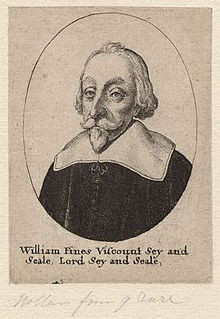William Fiennes, 1st Viscount Saye and Sele
| William Fiennes, 1st Viscount Saye and Sele | |
|---|---|

Engraving of Lord Saye by Wenceslas Hollar, mid-seventeenth century.
|
|
| Born | 28 June 1582 Broughton Castle |
| Died | 14 April 1662 |
| Burial place | Broughton, Oxfordshire |
| Spouse(s) | Dorothy Waldegrave |
| Children | James Fiennes |
| Parent(s) | Richard Fiennes, 7th Baron Saye and Sele, Constance Kingsmill |
William Fiennes, 1st Viscount Saye and Sele (28 June 1582 – 14 April 1662) was an English nobleman and politician, known also for his involvement in several companies for setting up overseas colonies.
He was born at the family home of Broughton Castle near Banbury, in Oxfordshire, the only son of Richard Fiennes, 7th Baron Saye and Sele, and his wife Constance, daughter of Sir William Kingsmill. He was educated at New College, Oxford. He was a descendant and heir of the sister of William of Wykeham, the college's founder. Fiennes succeeded to his father's barony in 1613.
During the latter part of James I's reign Saye was one of the most prominent opponents of the court. In 1621 he was active against Francis Bacon, and urged that he should be degraded from the peerage. In 1622 he opposed the benevolence levied by the king, saying that he knew no law besides parliament to persuade men to give away their own goods; he spent six months in the Fleet Prison, and then had a period of house arrest. When George Villiers, 1st Duke of Buckingham returned from Spain and proposed to break the Spanish match, the duke and baron became temporary allies; and Saye became Viscount Saye and Sele in 1624. He pressed home the attack on Lionel Cranfield, 1st Earl of Middlesex.
In the parliament of 1626 Saye was back in opposition; he defended the privileges of the peerage against the new king Charles I in the cases of John Digby, 1st Earl of Bristol and Thomas Howard, 21st Earl of Arundel, and intervened on behalf of Dudley Digges when Buckingham accused him of speaking treason. In the autumn of the same year he was among those who refused to pay the forced loan. In the parliament of 1628, he employed with success the right of peers to protest. In the debates on the Petition of Right he opposed the reservations and amendments of the court party.
...
Wikipedia
